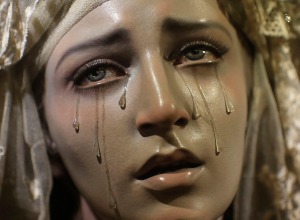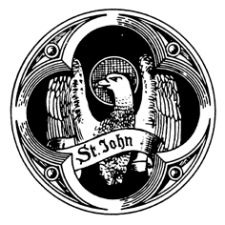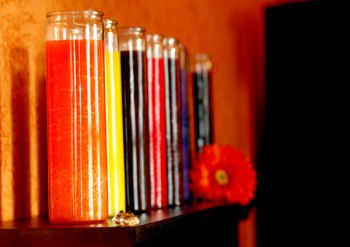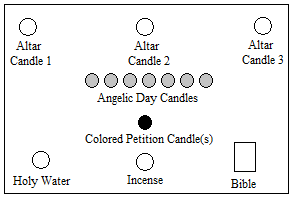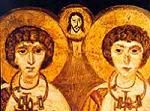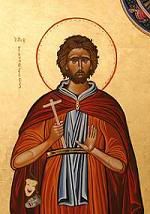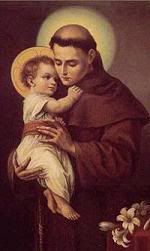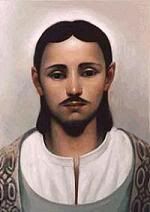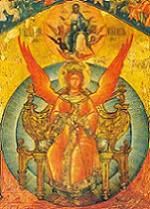 It is with some hesitation that I share this ritual, but the beauty and simplicity with which it strengthens our Gnosis is, I feel, worth sharing. This ritual, with some slight redactions, comes from Jeremy Puma’s Sacrament of the Apple. It was published in his book The Book of the Stranger, a prayerbook for the Order of Allogenes, which is available for sale in a nicely printed form, and is also available for free as a PDF here.
It is with some hesitation that I share this ritual, but the beauty and simplicity with which it strengthens our Gnosis is, I feel, worth sharing. This ritual, with some slight redactions, comes from Jeremy Puma’s Sacrament of the Apple. It was published in his book The Book of the Stranger, a prayerbook for the Order of Allogenes, which is available for sale in a nicely printed form, and is also available for free as a PDF here.
I share it because, like Jeremy, I had a dream about this same ritual. While I was working on composing a ritual based on this dream, for public celebration, Jeremy shared that he had also dreamt of a sacrament of the fruit of knowledge, and presented his ritual to the OA. I must admit, I liked his ritual better than mine, for its brevity, as well as its content. While the ritual calls for an apple (the star within the apple being a powerful symbol of the Pleroma), I could also see it being celebrated with a pomegranate, if one desired. As scripture never specifies what the Fruit of Knowledge was, a pomegranate may be a slightly more hygienic option, although the symbolism of the star would be lost. However you decide to celebrate this ritual, I strongly encourage you to give it a try!
Mystery of the Tree of Knowledge
This short ritual may be performed singly or collectively. Required materials: apple(s), holy water/aspergillum, incense, knife, bell.
℣. In the name of the + Unknown Father, in Truth, Mother of all, in union and redemption and sharing of the powers, peace be to all on whom this name reposes.
℟. Amen
℣. O Father of the light, Who possesseth the incorruptions, hear us just as Thou hast taken pleasure in Thy holy child Jesus Christ. For He became for us an illuminator in the darkness.
Yea, hear us! Hear us, Father, just as Thou heardest Thine alone-begotten Son, and received Him, and gave Him rest from any imperfection.
Thou art the One Whose power is perfect; Thine armor, resplendent, is full of the Light above all lights; Thy living presence toucheth the Pleroma; the Word saveth the Cosmos through the repentance of Sophia; life hath come into existence because of Thee.
Thou art the thought and the entire serenity of the solitary. Again: Hear us just as Thou heardest Thine Elect. Through Thy sacrifice, these will enter; through their good works, these have saved their souls from these blind limbs, so that they might exist eternally. Amen.
℣. (ringing bell) O Ye Lumniaries, Lights before the Throne of the Æons of Barbelo and the Limitless Light, be present with us as we participate in this Mystery. May this place be sanctified and protected from all Archonic influence, and be made holy by Your eternal and enduring presence.
(The celebrant lights incense and sprinkles holy water in four directions while intoning the names of the Luminaries and the æons of their regions. If other altar servers are available, the area may also be censed.)
(Facing East) Harmozel-Orneos-Euthrounios
(Facing North) Oraiael-Aphreudasos-Armedos-Arros
(Facing West) Daveithe-Laraneus-Epiphanios-Eideos
(Facing South) Eleleth-Kodere-Epiphanios-Allogenios
℣. In the name of the + Father, and of the Son, and of the Holy Spirit.
℟. Amen.
℣. Let us pray to the Christos and Sophia that our transgressions be forgiven.
(Kneeling)
℟. Glory be to Thee, O Iesus Christos Parakletos Sophia, Who wast sent to redeem us; O Thou Who didst descend into the world of matter, Thou ineffable Word and Wisdom: Forgive us our transgressions. Free us from the chains of limitation, and carry us to the Fullness of the Limitless Light. Amen.
(The celebrant rises, places the apple on altar. Raising his hands above the apple, he intones the following willfully.)
℣. Holy Sophia, be with us and sanctify us. Unveil the Pleroma to us, and allow us a vision of that Kingdom which is forever spreading out upon the Earth, but which we do not see. Come upon and descend into this fruit, as Thou didst descend into the Fruit in the Garden of Eden, granting the Gnosis of the Light to our Holy Mother Eve, and Holy Father Adam.
℣. Then the female spiritual principle came in the serpent, the instructor; and it taught them, saying:
“What did he say to you? Was it, ‘From every tree in the garden shall you eat; yet from the tree of recognizing good and evil do not eat’?”
℟. The carnal woman said, “Not only did he say ‘Do not eat’, but even ‘Do not touch it; for the day you eat from it, with death you shall die.’”
℣. And the serpent, the instructor, said, “Do not be afraid. With death you shall not die; for it was out of jealousy that he said this to you. For he knows that when you eat from it, your intellect will become sober, and you will come to be like unto gods, recognizing the difference that obtains between evil men and good ones.”
℟. And the carnal woman took from the tree and ate; and she gave to her husband as well as herself; and these beings that possessed only a soul, ate. And their imperfection became apparent in their lack of knowledge; and they recognized that they were naked of the spiritual element, and took fig leaves and bound them upon their loins.
(The celebrant slices apple in half across the width, holding aloft the two halves exposing seeds to all present. )
℣. Behold His promise, and Her sign to us, and to our descendants.
(The celebrant passes apple to altar servers, each taking a bite and passing them along to congregants. Each congregant also takes a bite of the apple. More apples may be used for larger congregations, but care should be taken that enough is made available for all who wish to partake. After everyone has partaken, the remnants [core, seeds, stem] are returned to the altar. The celebrant then takes up the remnants, holding them aloft.)
℣. Now have we partaken of the fruit of the Tree of the Gnosis of Good and Evil. May our words and actions always reflect our origin in the Light, and our residence in the Pleroma. Let us rest a moment in the silence of our glorious Lady Sophia, and contemplate the role of the Christos in our hearts and minds.
(Moment of silence.)
℣. Glory be to the Father, and to the Son, and to the Holy Spirit;
℟. As it was in the beginning, is now, and ever shall be, unto the æons of æons. Amen.
℣. As our corporeal bodies shall return to the dust from which we were made, so shall the corpse of this apple become one with the body of the Earth.
(The celebrant sets apple remnants aside for composting.)
℣. Let us praise the Lord after the fashion of Solomon the Wise:
My heart was pruned
and its flower appeared,
then grace sprang up in it,
and my heart produced fruits for the Lord.
℟. For the Most High pruned my heart
by His Holy Spirit,
then He uncovered my inward being towards Him,
and filled me with His love.
℣. And His opening of me became my salvation,
and I ran in the Way,
in His peace,
in the way of truth.
℟. From the beginning until the end
I received His Gnosis.
℣. And I was established upon the rock of truth,
where He had set me.
℟. And speaking waters touched my lips
from the fountain of the Lord, generously.
℣. And so I drank and became intoxicated,
from the living water that does not die.
℟. And my intoxication did not cause ignorance,
but I abandoned vanity,
℣. And turned toward the Most High, my God,
and was enriched by His favors.
℟. And I rejected the folly cast upon the earth,
and stripped it off, and cast it from me.
℣. And the Lord renewed me with His garment,
and possessed me by His light.
℟. And from above He gave me immortal rest,
and I became like the land that blossoms,
and rejoiceth in its fruits.
℣. And the Lord is like the sun
upon the face of the land.
℟. My eyes were enlightened,
and my face received the dew;
℣. And my breath was refreshed
by the pleasant fragrance of the Lord.
℟. And He took me to His Paradise,
wherein is the wealth of the Lord’s pleasure.
℣. I beheld blooming and fruit-bearing trees,
And self-grown was their crown.
℟. Their branches were sprouting,and their fruits were shining.
From an immortal land were their roots.
℣. And a river of gladness was irrigating them,
And round about them in the land of eternal life.
℟. Then I worshipped the Lord because of His magnificence.
℣. And I said: Blessed, O Lord, are they who are planted in Thy land,
and who have a place in Thy Paradise;
℟. And who grow in the growth of Thy trees,
and have passed from darkness into light.
℣. Behold, all Thy laborers are fair,
they who work good works,
and turn from wickedness to Thy pleasantness.
℟. For the pungent odor of the trees is changed in Thy land,
And everything becomes a remnant of Thyself.
Blessed are the workers of Thy waters,
and eternal memorials of Thy faithful servants.
℣. Indeed, there is much room in Thy Paradise.
And there is nothing in it which is barren,
but everything is filled with fruit.
Glory be to Thee, O God, the delight of Paradise for ever.
℟. Alleluia!
℣. Having thus partaken of the Fruit of the Tree of the Gnosis of Good and Evil, let us depart this place, and spread the Light of the Divine Sophia wherever we may tread. O Ye Holy Luminaries who stand before the throne of the Limitless Light, we thank You for Your presence at this rite, and honor Your Light. Be with us as we return to the realm of limitations and the World of matter.
(Facing South) Eleleth-Kodere-Epiphanios-Allogenios
(Facing West) Daveithe-Laraneus-Epiphanios-Eideos
(Facing North) Oraiael-Aphreudasos-Armedos-Arros
(Facing East) Harmozel-Orneos-Euthrounios
℣. In the name of the Father, and of the Son, and of the Holy Spirit: From whence have you come?
℟. We have come from the Light, from the place where the Light came into being, sat within Itself, and appeared in the image of the Pleroma.
℣. Are you the Light?
℟. We are Its children, and we are the chosen of the living Father and of Barbelo.
℣. What is the evidence of the Father and Barbelo in you?
℟. It is a movement, and it is a rest.
℣. Go, then, in peace, and tell no one what hath happened within.
℣. In the name of the + Father, and of the Son, and of the Holy Spirit.
℟. Amen.

